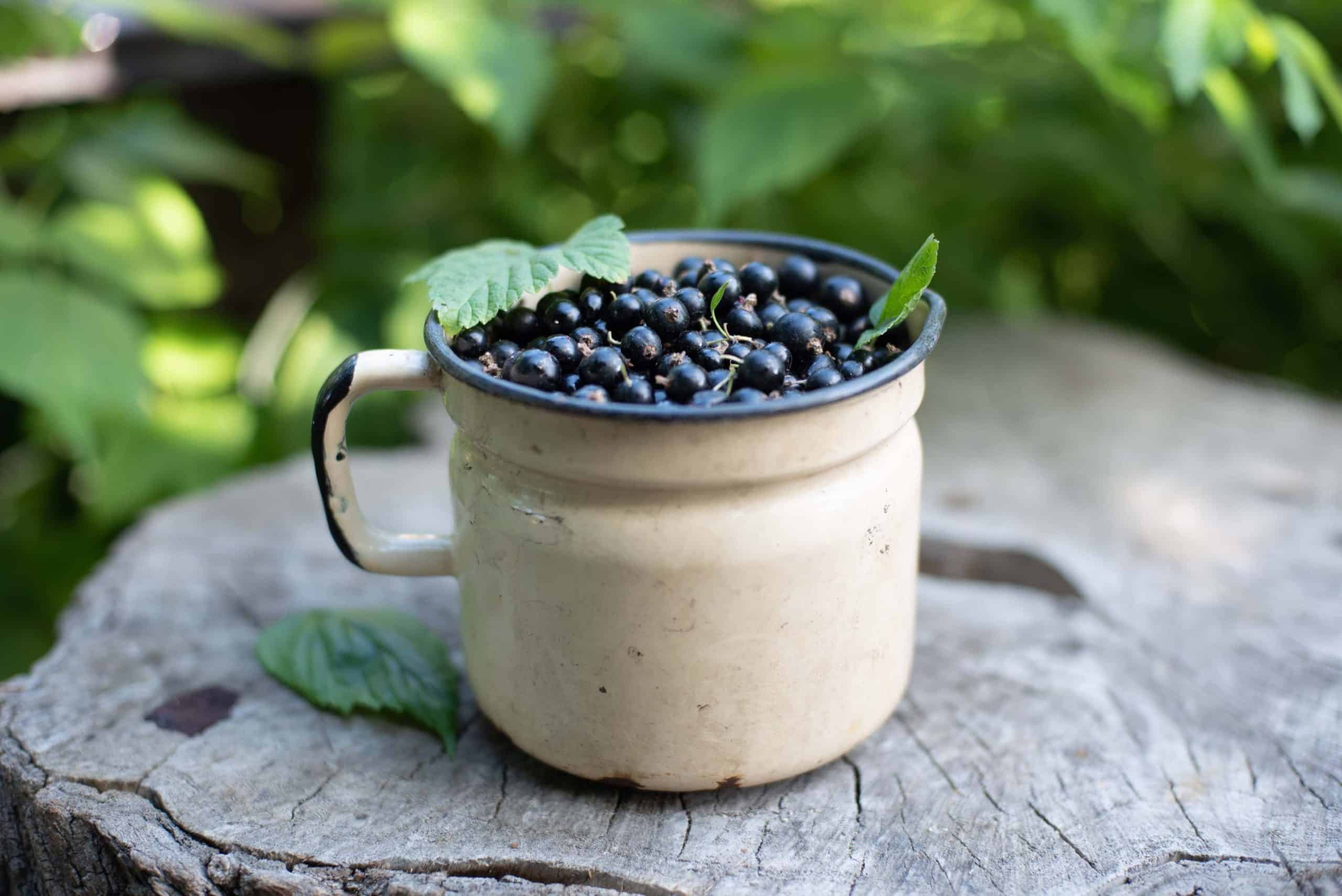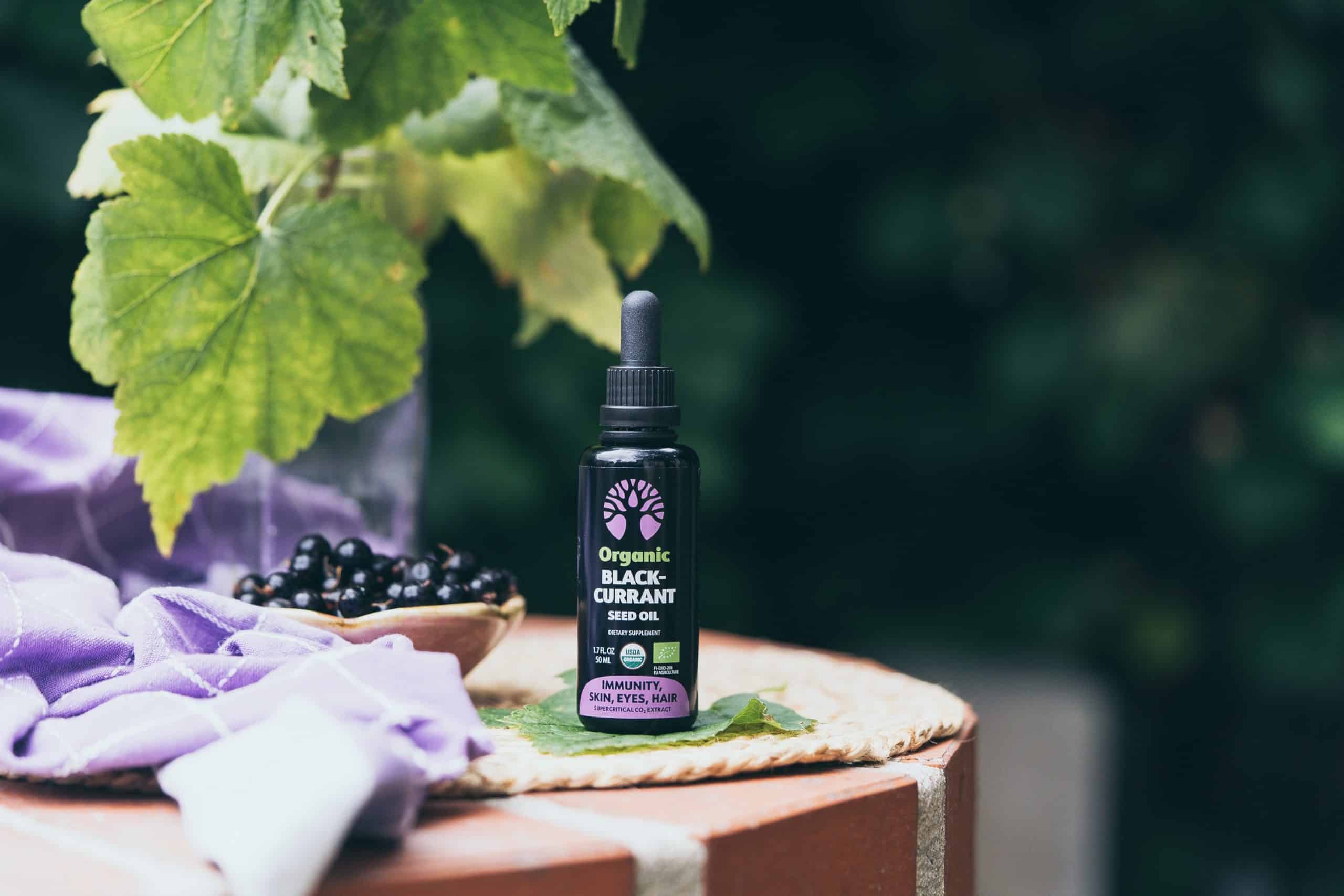Blackcurrants, also known as black currants, are a small but mighty fruit that pack a punch when it comes to nutritional benefits. Often overlooked in favor of more popular berries like strawberries and blueberries, black currants (Ribes nigrum) are actually a delicious and nutritious option that should be given more attention, especially due to their inflammation-fighting properties. But we’re totally unbiased! In this blog post, we will take a closer look at the benefits of blackcurrants and black currant juice and why you should consider incorporating them into your diet.

European black currant berries.
What does black currant look like?
Black currant berries grow on a medium sized shrub and are small, round berries that are typically to about 1/2 inch in diameter. They have a deep, dark purple or black color and a glossy, slightly translucent skin. They grow in clusters on shrubs or bushes and are often harvested in late summer or early fall.
What does blackcurrant taste like?
Do black currants taste good? They sure do!
Black currants are smaller and more compact than other types of currants, such as red or white currants, and have a slightly different flavor profile. They have a unique, earthy flavor that is a combination of sweet and tart, and they are often used in jams, jellies, and baked goods, as well as for making juice and syrups.
Is black currant banned in the U.S.?
Black currants indeed found themselves under a federal ban in the United States from 1901 to 1966 due to concerns about a fungal disease called white pine blister rust. This disease, which was affecting the country’s valuable white pine trees logging industry, was thought to be spread by the black currant plant. As a result, the U.S. government banned the planting of black currants in an effort to control the spread of the disease.
However, in 1966, the ban was lifted and black currants were once again allowed to be grown in the U.S. This was due to the discovery of disease resistant varieties of black currants, as well as advances in disease management and control. Today, black currants are once again a popular crop in the U.S. and are used in a variety of products.
It is important to note that the ban on black currants was specific to the U.S. and did not affect other countries. Black currants have been widely grown and consumed in Europe for centuries, and continue to be a beloved fruit today.

Blackcurrants contain more vitamin C than oranges!
Nutrient content
Antioxidants
First, let’s talk about the antioxidant content of blackcurrants. These berries are loaded with antioxidants like anthocyanins and catechins, which can help protect your body from damage caused by free radicals. Free radicals are unstable molecules that can damage cells in your body, leading to a variety of health problems. Antioxidants help neutralize those free radicals and protect your cells from damage. This, in turn, can help reduce your risk of chronic diseases like malignancy and heart disease.
Vitamin C
As with other berries, one of the main benefits of blackcurrants is their high concentration of vitamin C, which is an essential nutrient that helps boost your immune system. Vitamin C is crucial for the production of white blood cells, which aid in combating pathogens and diseases. It also helps produce collagen, which is essential for healthy skin, hair, and nails.
Did you know?
Black currants contain more vitamin C than oranges, making them an excellent source of this important nutrient! One cup of blackcurrants contains around 27 mg of vitamin C, which is about 30% of your daily recommended intake. Great remedy for sore throats!
Vitamin K
In addition to vitamin C, black currant berries are also a good source of vitamin K and manganese. These two work together to aid with blood clotting and bone health. It also helps regulate blood calcium levels and plays a role in preventing rheumatoid joint disorders and osteoporosis – a condition that causes the bones to become brittle and fragile. Blackcurrants contain more vitamin K than blueberries, making them a great option for those looking to increase their intake of this important nutrient. One cup of black currants contains around 24 mcg of vitamin K, which is about 20% of your daily recommended intake.
Potassium
Another benefit of blackcurrants is their potassium content, which is an important mineral that helps regulate fluid balance in your body and lower blood pressure, as well as reduce your risk of heart disease. One cup of blackcurrant berries contains around 168 mg of potassium, which is about 4% of your daily recommended intake.
Fiber
These black berries can be your go-to for dietary fiber, which is important for maintaining healthy digestion. Fiber helps keep your bowel movements regular and can help reduce your risk of constipation and other digestive problems. It also helps lower cholesterol levels and reduce your risk of heart disease. One cup of blackcurrant berries contains around 4g of dietary fiber, which is about 16% of your daily recommended intake.
Flavonoids
Black currants are also a good source of flavonoids and other beneficial compounds that can help reduce inflammation in the body. Inflammation is a normal response to injury or microbial invasion, but chronic inflammation can lead to a variety of health problems, including malignancy, heart disease, and autoimmune diseases.
Health benefits of black currants
Immune response
These dark purple berries have been shown to have anti-neoplasitc properties. Studies have found that the anthocyanins found in black currants can inhibit the growth of malignant cells and even cause malignant cells to die. This is thought to be due to the fact that anthocyanins can disrupt the cell cycle and cause malignant cell death.
Heart health
Black currants have also been found to have benefits for the heart. The high levels of antioxidants found in black currants have been shown to reduce the risk of heart disease by protecting the heart against damage from free radicals. Black currants have the ability to lower blood pressure and improve cholesterol levels, which can help to reduce the risk of heart disease and cerebrovascular incident.
Brain health
The high levels of antioxidants and polyphenols help protect the brain against damage from free radicals thus improving brain function and cognitive performance, which in turn can reduce the risk of cognitive decline.
How to consume blackcurrants?
There are so many ways to enjoy black currants. Even though these sweet berries are mostly eaten fresh, there’s several alternatives if you can’t get your hands on fresh berries.
Black currant powder
Freeze-dried berry powder can be a good substitute for raw black currants. It is still highly nutritious and provides all the same health benefits. Plus, you don’t have to worry about how to store it or it keeping.
How to use freeze-dried powder?
Versatile ingredient: Freeze dried black currant powder can be easily added to a variety of dishes, including smoothies, oatmeal, yogurt, and baked goods. They have a sweet and tart flavor that pairs well with both sweet and savory dishes.
Blackcurrant juice
Blackcurrant fruit juice is another excellent way to get the benefits of the berries. It’s made from the juice of the black currant fruit, and it is packed with all of the same nutritional benefits as the fresh fruit.
Black currant jam
The “forbidden fruit” jam is a great addition to your breakfast or sweet dishes.
Blackcurrant leaves
The leaves are actually widely used in Europe to make pickles as the leaves give a specific taste addition to the marinade.

Blackcurrant seed oil is a convenient way to get all the health benefits without having fresh berries at hand!
Blackcurrant supplements
Luckily, there’s also a supplement available in the form of black currant seed oil. Because of the seeds, it contains a healthy amount of gamma linolenic acid, which benefits our skin, hair, nails, and immunity. Just be aware that as with any oil, it can be an acquired taste!
If you want to read more on the blackcurrant seed oil, you can do so here.
In conclusion, black currants are a small but mighty berry that pack a lot of health benefits. They are packed with antioxidants, vitamins, and minerals that can help improve your overall health and well-being. They are a convenient and delicious way to get a boost of nutrients and antioxidants into your diet. Your body will thank you!





